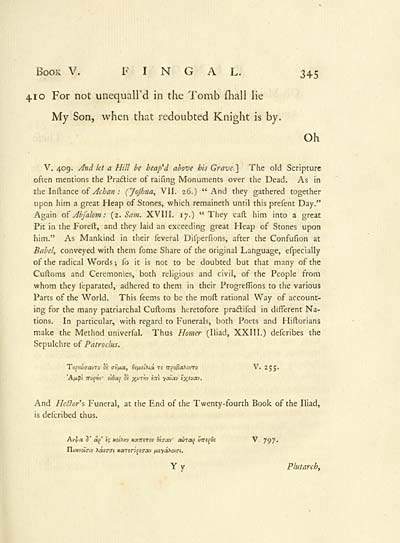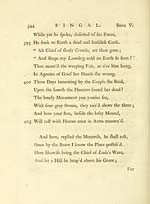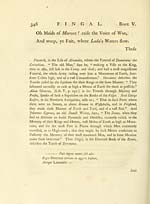Ossian Collection > Fingal of Ossian
(443)
Download files
Complete book:
Individual page:
Thumbnail gallery: Grid view | List view

Book V. F I N G A L. 345
410 For not unequalFd in the Tomb fliali lie
My Son, when that redoubted Knight is by.
Oh
V. 409. And let a Hill be heap'd above his Grave.} The old Scripture
often mentions the Pradtice of raifing Monuments over the Dead. As in
the Indnnce of Acbari : (JoJAua, VII. 26.) "And they gathered together
upon him a great Heap of Stones, which remaineth until this prefent Day."
Again of Abfalom : {2. Sam. XVIII. 17.) "They caft him into a great
Pit in the Foreft, and they laid an exceeding great Heap of Stones upon
him." As Mankind in their feveral Difperfions, after the Confufion at
Babel, conveyed with them feme Share of the original Language, efpecially
of the radical Words ; fo it is not to be doubted but that many of the
Cuftoms and Ceremonies, both religious and civil, of the People from
whom they feparated, adhered to them in their ProgrefHons to the various
Parts of the World. This feems to be the mod rational Way of account-
ing for the many patriarchal Cuftoms heretofore praftifed in different Na-
tions. In particular, with regard to Funerals, both Poets and Hiftorians
make the Method univerfal. Thus Homer (Iliad, XXIII.) defcribes the
Sepulchre of Patroclus.
Tcpmano Je (ni/MX, Bi/jLiiXid te "pr^o^ahovTo V. 255-
And He^or's Funeral, at the End of the Twenty-fourth Book of the Iliad,
is defcribed thus.
AivJ-a y ap' I; xoi'^viv xawerov ^k^av cuitoi^ uTre^Se V. 797.
Y y Plutarch,
410 For not unequalFd in the Tomb fliali lie
My Son, when that redoubted Knight is by.
Oh
V. 409. And let a Hill be heap'd above his Grave.} The old Scripture
often mentions the Pradtice of raifing Monuments over the Dead. As in
the Indnnce of Acbari : (JoJAua, VII. 26.) "And they gathered together
upon him a great Heap of Stones, which remaineth until this prefent Day."
Again of Abfalom : {2. Sam. XVIII. 17.) "They caft him into a great
Pit in the Foreft, and they laid an exceeding great Heap of Stones upon
him." As Mankind in their feveral Difperfions, after the Confufion at
Babel, conveyed with them feme Share of the original Language, efpecially
of the radical Words ; fo it is not to be doubted but that many of the
Cuftoms and Ceremonies, both religious and civil, of the People from
whom they feparated, adhered to them in their ProgrefHons to the various
Parts of the World. This feems to be the mod rational Way of account-
ing for the many patriarchal Cuftoms heretofore praftifed in different Na-
tions. In particular, with regard to Funerals, both Poets and Hiftorians
make the Method univerfal. Thus Homer (Iliad, XXIII.) defcribes the
Sepulchre of Patroclus.
Tcpmano Je (ni/MX, Bi/jLiiXid te "pr^o^ahovTo V. 255-
And He^or's Funeral, at the End of the Twenty-fourth Book of the Iliad,
is defcribed thus.
AivJ-a y ap' I; xoi'^viv xawerov ^k^av cuitoi^ uTre^Se V. 797.
Y y Plutarch,
Set display mode to: Large image | Transcription
Images and transcriptions on this page, including medium image downloads, may be used under the Creative Commons Attribution 4.0 International Licence unless otherwise stated. ![]()
| Early Gaelic Book Collections > Ossian Collection > Fingal of Ossian > (443) |
|---|
| Permanent URL | https://digital.nls.uk/77607462 |
|---|
| Description | Selected books from the Ossian Collection of 327 volumes, originally assembled by J. Norman Methven of Perth. Different editions and translations of James MacPherson's epic poem 'Ossian', some with a map of the 'Kingdom of Connor'. Also secondary material relating to Ossianic poetry and the Ossian controversy. |
|---|
| Description | Selected items from five 'Special and Named Printed Collections'. Includes books in Gaelic and other Celtic languages, works about the Gaels, their languages, literature, culture and history. |
|---|

